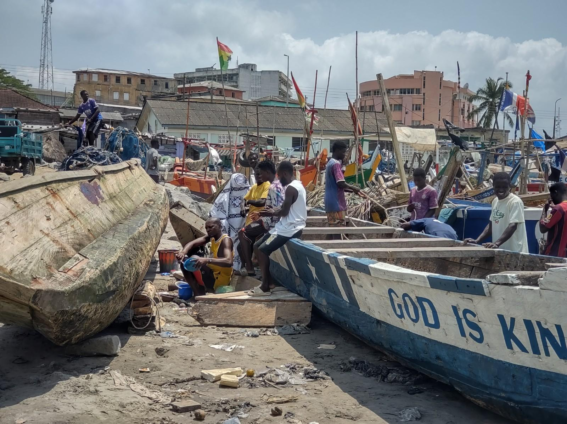Ghana’s fisheries sector is a major contributor to the country’s economy, providing jobs and nutrition to millions, but for a long time now the sector has come under severe pressure from illegal fishing activities.
Activities of illegal foreign fishing trawlers are not only depleting fish stocks and affecting the livelihood of local fishers, but they are also a threat to the country's food security.
The illegal activities, by both local and foreign actors, have over time eroded the gains made in the sector and pose a great threat to the sustainability of the local sector and to the country’s economy.
A worrying phenomenon that further compounds the woes of Ghana’s finishing industry is the sheer number of foreign trawlers in Ghanaian waters.
In our investigations into the fisheries sector, we found different data on the number of foreign vessels in Ghanaian waters. A study by the Overseas Development Institute (ODI) puts the number of foreign trawlers operating in Ghana at 137. These vessels are operating with impunity, while law enforcers look on, our sources told us.
A fisheries economist at the Ghana Institute of Management and Public Administration (GIMPA), Prof Wisdom Akpalu says the highest number of vessels ideal for Ghana’s fishing industry should be 48. He explains that with just about 48 vessels the country can generate the highest benefits from the sector.
Hit hard by the activities of these trawlers, local fishermen are expressing their frustrations over what they see as an invasion. They don’t even believe official statistics on foreign trawlers.
Adjetey Tawia, the organiser of the canoe and fishing gear owners association in Tema, said, “things have deteriorated because from 2001 when we received the Chinese trawlers into our oceans, a lot of damages have occurred in our ocean. We have 74 Chinese trawlers on our oceans but we the fishermen know it is more than that. How can you allow such a large number to work in our small oceans?” He said.
Meanwhile, data from the Fisheries Commission (FC) on registered vessels in Ghana’s territorial waters in 2021 alone indicates that a total of 80 vessels have been in operation.
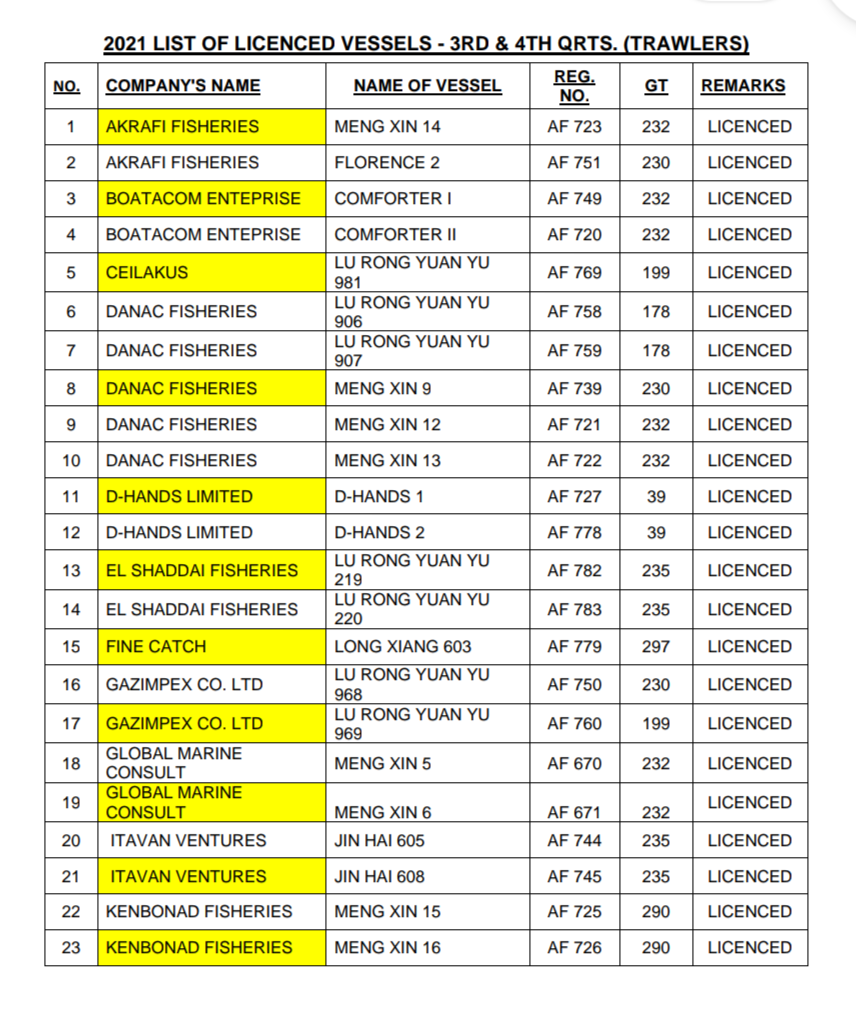
BO disclosures in the fisheries sector
While the fisheries sector is a capital-intensive investment sector, it appears the lawmakers did not include it in the beneficial ownership regime. But officials admit it should have been in.
Deputy Chief Company Inspector at the Office of the Registrar of Companies (ORC), Mrs Yayira Banini said unlike companies that operate in the financial, minerals, petroleum, insurance and real estate sectors among others, which are high-risk areas, “the fisheries sector is not part of the high-risk area and there will certainly be the need to amend the law to rope in the sector.”
“The fisheries sector has not been on the radar with regards to BO disclosures because the sector is considered not a high-risk area and so there will be the need for some amendments to the law,” she stated.
Mrs Banini, however, assured that even though the current law does not absolve low-risk companies from disclosing their beneficial ownership information, the ORC would critically focus on the fisheries sector and expand its scope to ensure that companies there comply with BO requirements.
“Being a new concept the ORC will keep updating and developing the BO registry to add up to the existing list,” she added.
Meanwhile, data from the ORC of a sample of eight fishing companies registered in 2021, show no single company in the sector has filed their BO information. The data has only the usual information of shareholders and directors of the companies. But, it must be noted that the composition of the shareholders is both foreign and local, in accordance with the shareholding structure stipulated by Section 47 (1) (b) of the Fisheries Act, 2002, Act 625, though under the current arrangements, the general threshold for a BO is 10 per cent or greater interest in a company, be it direct or indirect interest.
From the list of shareholding of the sampled companies, it is indicative by the given names that they are of Asian origin. For example, the directors of ‘Dong Sheng Limited’ are given as Xing Yanwei, and Yueke Bi but among the shareholders, Rongcheng Ocean Fishing Co. Ltd. holds the majority shares of 756,000. Similarly, AFKO Fishes Company Limited has Yopungok Han being the highest stake of 2,000,000 among the six shareholders.
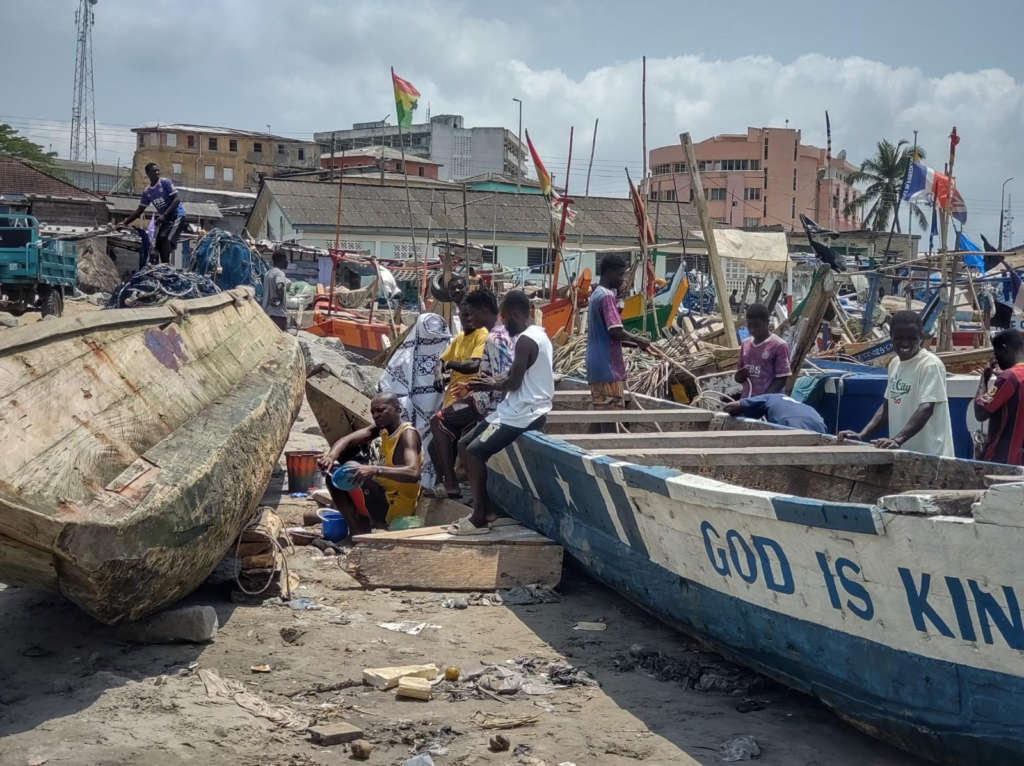
According to the data, as of the 3rd and 4th quarters of 2021, there were 23 licensed fishing companies and 45 licensed fishing vessels or trawlers. In the same period of 2021, there were 13 tuna-licensed fishing companies operating through 28 vessels. The data suggested that four companies were foreign-owned. From the data, the BO regime has not significantly impacted the fisheries sector.
Fronting and abuse of rules
Even though about 44,000 companies in Ghana have so far complied with Ghana’s Beneficial Ownership Transparency initiative and submitted to submitted information about their corporate ownership structure or legal and beneficial owners to the ORC, according to the Centre for Extractive Development Africa, Fisheries economist, Prof Akpalu says local people are fronting for foreigners, contrary to the provisions of Ghana’s fishing regulations.
“At the end of the day, foreigners get almost all of the benefits. We get nothing,” he laments.
Prof Akpalu stressed that the Fisheries Act 625 2002 prohibits foreigners from operating industrial vessels/trawlers in Ghana. He explained that industrial trawling is a preserve of Ghanaians so those vessels are supposed to be fully owned by Ghanaians. But “the problem is that Ghanaians do not have the capital to acquire those vessels and the laws make provisions for hire purchase agreements, so if you don’t have money, you can buy on hire purchase and pay over time,” he explained.
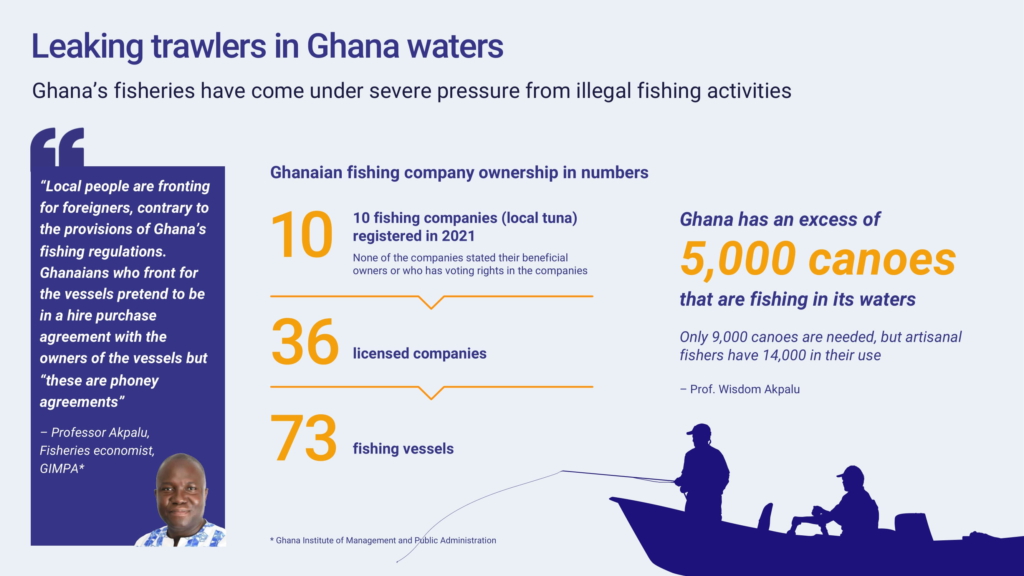
According to the fisheries expert, Ghanaians who front for the vessels pretend to be in a hire purchase agreement with the owners of the vessels but “these are phoney agreements.”
“As per those agreements, the vessels are supposed to be fully owned by Ghanaians at the end of five years for example, but then we see that by the end of the five years, all they do is to change the name and a new person becomes the new owner who has gone into some hire purchase agreement with the same vessel so the same thing keeps rotating. This means that although we have laws that make it illegal for foreigners to operate those vessels in our waters, the provisions in the law that make it possible for one to go into a hire purchase agreement have been abused,” Prof Akpalu explained.
“The beneficial owners are foreigners,” the fisheries expert asserted. Similarly, Nii Odametey, Chief Fisherman at the Tema Newtown Canoe Basin, alluded to the team “the trawlers are owned by foreigners, not Ghanaians.”
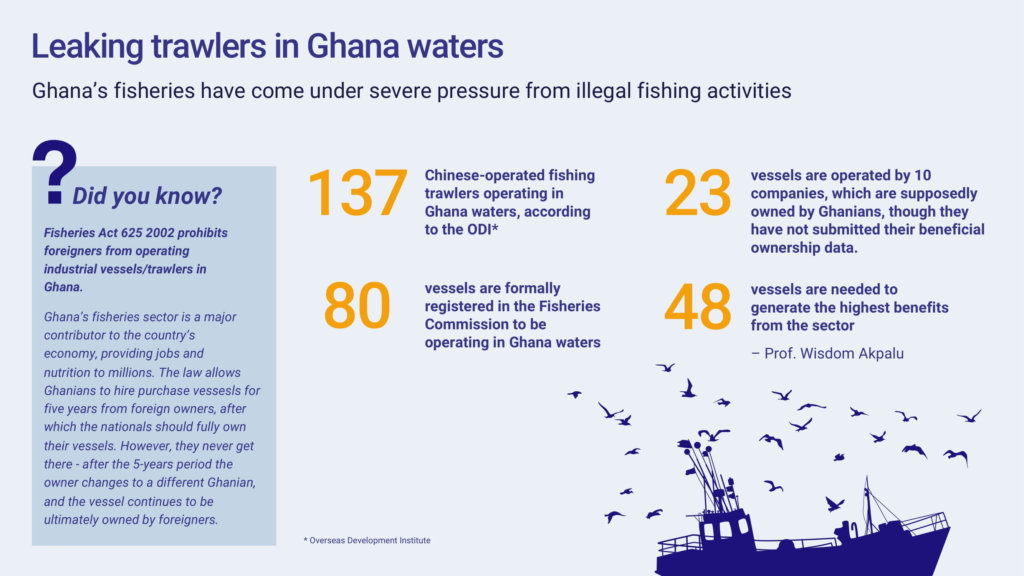
Background to Beneficial Ownership (BO) in Ghana
Ghana has in 2016, committed to implementing a BO regime. This was backed by signing on to several global conventions such as Extractive Industries Transparency Initiative (EITI), Financial Action Task Force ( FATF), Global Forum, Open Government Partnership (OGP), and United Nations Convention Against Corruption (UNCAC) among others.
The ORC was mandated to house the BO central register. The Companies Act 1963 (Act 179) was amended to include provisions on BO. This amendment was the Companies Amendment Act, 2016 (Act 920) and Act 992 (2019)
Currently, all new companies are required to provide BO details before registration while existing ones are required to update ORC with their BOs. Companies are to give the ORC their BO details at the time of filing annual returns and have a 2022 deadline, failing which sanctions will apply.
Depletion of fish stocks in Ghanaian waters
In 1992, the artisanal canoe fishers within a year could catch 35 tons of fish a year. In 2016/17, they were catching about 15 tons a year which is a sharp decline. And this is not peculiar to artisanal fishers. There is much evidence that certain fish stocks have completely gone extinct.
For example, artisanal fishers have over 14,000 canoes that are fishing in Ghanaian waters. But then not more than 9,000 vessels are required in the waters. So, Ghana has in excess of 5,000 plus canoes that are fishing in its waters. This is actually a problem and to compound this problem they are competing with these same stocks they are catching.
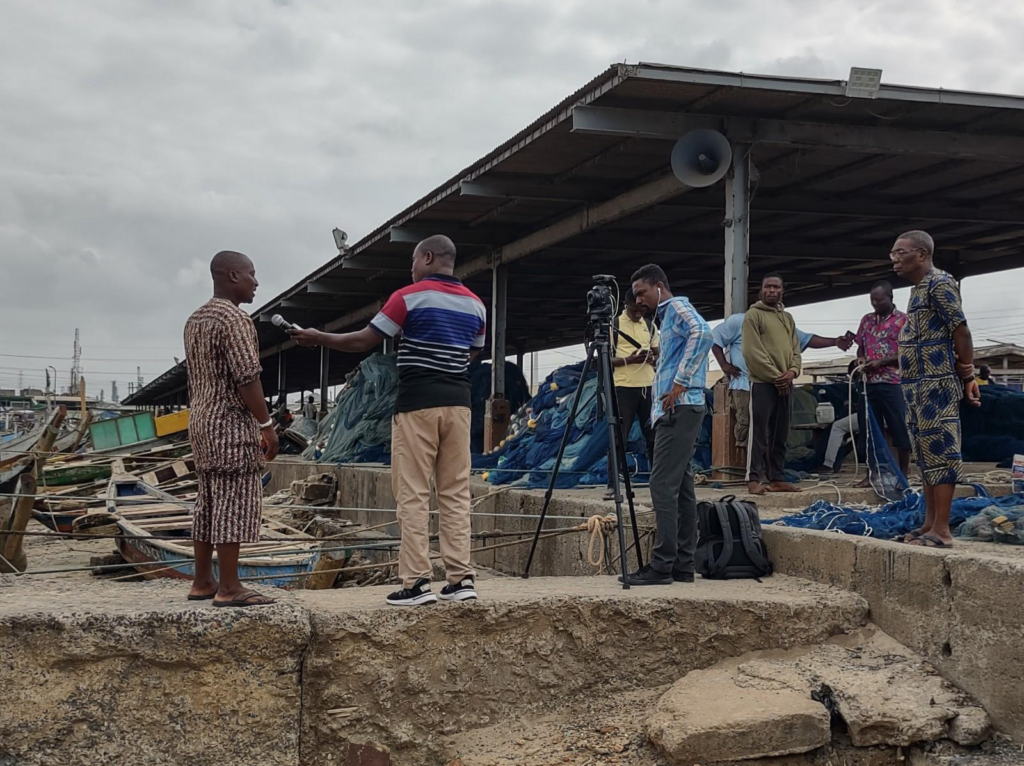
They normally catch the ones on the surface of the water like the anchovies, sardines and mackerel and these are the same stock the trawlers are targeting as their Saiko (term used in Ghana to refer to the transfer or ‘transhipment’ of fish at sea from industrial trawlers) meanwhile, they are not registered to catch these species that are free-flowing on the surface and mid-waters. They are licensed to catch bottom-dwelling species which are called the missile stock but they leave that or catch that and on top of it catch the ones supposed to be caught by artisanal vessels.
According to Prof Akpalu, “the main problem in our fisheries sector is the lack of political will to do the right things because we know the problems and we have been talking about this for a long time. The will to implement some of these policies that we have always recommended is our problem. If trawlers violate fishing regulations, for instance, we give them the option of either going to the courts or going to seek an alternative dispute resolution (ADR). And at ADR, the minister has so many powers and at the end of the day, he exercises an unfitted discretion on how much the trawler should pay.”
Laxity in the enforcement of the law
Most of the fishermen we spoke to in our investigations believe the challenge has to do with the enforcement of the country’s laws.
"This is why we have become an attractive place for foreign vessels that are just going around and looking for money. It will continue to be so when our punishments are not deterrent enough", Adjetey Tawia asserted.
The way forward
To help salvage the situation in the fisheries sector of the economy, Prof Akpalu makes the following recommendations.
He suggested that "to be able to see what happens in the trawlers, authorised video (monitoring system) devices should be placed in all trawlers. This would show what types of fish they are catching and in what quantities.
"We should, with immediate effect, do away with the ADR option for foreign vessels, or if we should have ADR at all, they should be mandated not to set fines below the minimum that the court would have fined an individual who engages in illegality.
“We should have ways of verifying whether those fronting for the trawler vessels are true owners of it or not. We should do it in such a way that if the hire purchase is for five years, at the end of the fifth year, the vessels are owned by the Ghanaian or confiscated by the state. If this is done well, we will have only Ghanaian vessels fishing in our waters. They will obey the rules and regulations and once we get the industrial trawlers in check, the artisanal fishermen will have no reason not to obey the rules and regulations,” according to the Fisheries Economist.
He added that the "government should stop subsidising premix fuel and use the money to support the artisanal fishing industry or communities by providing alternative livelihood empowerment for the youth.
"Oil Marketing Companies should be encouraged to set up fuel stations within the fishing communities to sell premix fuel at market rate and make sure it is always available by creating an enabling environment for private investors," he opined.
Chief Fisherman at the Tema Newtown Canoe Basin, Nii Odametey and his council members reiterated calls on the Ghanaian government to adequately resource the Ghanaian Navy and marine police so they can effectively protect the waters and ward off the industrial trawlers who illegally fish in Ghanaian waters.
“We are of the view that poaching from foreign industrial trawlers which is a contributory factor to the depletion of fish stocks makes nonsense of the implementation by the sector ministry of the closed season which is meant to replenish stocks,” the fishermen told the team during focus group engagements.
Speaking to the issue, the Chief Fisherman in Cape Coast, Kobina Kakraba believes there were about 100 foreign vessels operating in Ghanaian seas.
“When they see us, they run to the Ivorian border pretending to be working there and still bringing the catch here. When they see the navy is operating on the seas, they flee but once the navy leaves, they hurriedly return to do their illegal activities. Most of the trawler vessels belong to the Chinese. I believe that it is some ‘big’ men in the country who are behind their operations. Our own people are involved and it disturbs our work on the seas. The industrial trawlers are really disturbing us, they fish at places they are not supposed to,” Kobina Kakra lamented.
He urged the government to sack all of the trawlers from Ghanaian waters.
The organizer of the canoe and fishing gear owners association in Tema, Adjetey Tawia, bemoans how illegal activities are affecting artisanal fishing. According to him, the trawlers target some particular fishes, if their nets get hold of the fishes they are not interested in, they discard them back into the sea. This activity pollutes the sea.
Fish production
The Ministry of Fisheries and Aquaculture Development 2020 Annual Progress report shows a total domestic fish production of 471,794.79 metric tons (mt) in 2020 as against a year target of 562,063.82 mt.
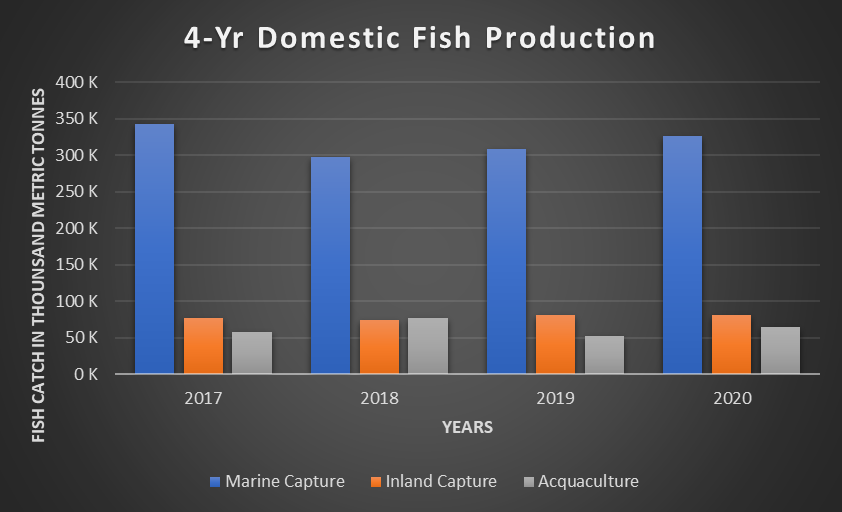
Though the actual domestic fish production for 2020 fell short of the target by 16.1 per cent, it was an improvement on that of 2018 (452,679.30) and 2019 (465,700.03). The total domestic production figures show a general increasing trend of 2.6 per cent for the past three years with a decline of 0.09 per cent between 2018 and 2019 and 0.49 per cent between 2019 and 2020.
Domestic fish production is from three main sources namely marine, inland capture fisheries and aquaculture sub-sectors. The marine sub-sector contribution to domestic fish production in 2020 was 326,867.56 mt as against a target of 347,754.11 mt, a shortfall of 6 per cent.
Analysis of the marine production figures from 2017 to 2020 shows a relatively increasing production trend of 4.6 per cent. (This may be partly due to the overexploitation of marine fishery resources resulting from illegal fishing activities, climate change, and increased fishing efforts among others).
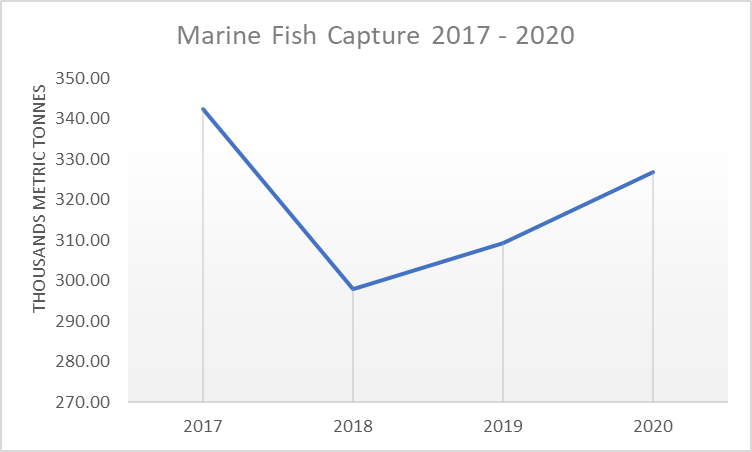
The contribution of inland capture fisheries mainly from the Volta Lake in 2020 was 80,923.18 mt representing 17.2 per cent of domestic fish production for the year.
A comparative analysis of the inland capture fisheries production for 2019 and 2020 shows a decrease in production level by 0.3 per cent. It is noted from the data that aquaculture production for 2019 and 2020 fell below the production figure for 2018 by 31.68 per cent and 16.47 per cent respectively.
It is also noted that even though aquaculture production for 2020 showed a 22.3 per cent increase over that of 2019, the target of 129,302.00 mt for the year was not met.
During the year (2020), a total of 193,226.87 mt of fish were imported to augment domestic fish production/supply to meet domestic fish requirements for the year, while total fish export was 69,152.43 mt. Fish imported are mostly low-valued but high-quality fish such as chub mackerel, horse mackerel and sardinella to offset the deficit in domestic fish production. Exported fish products include canned and raw tuna, frozen demersal fish, and dried and smoked fish.
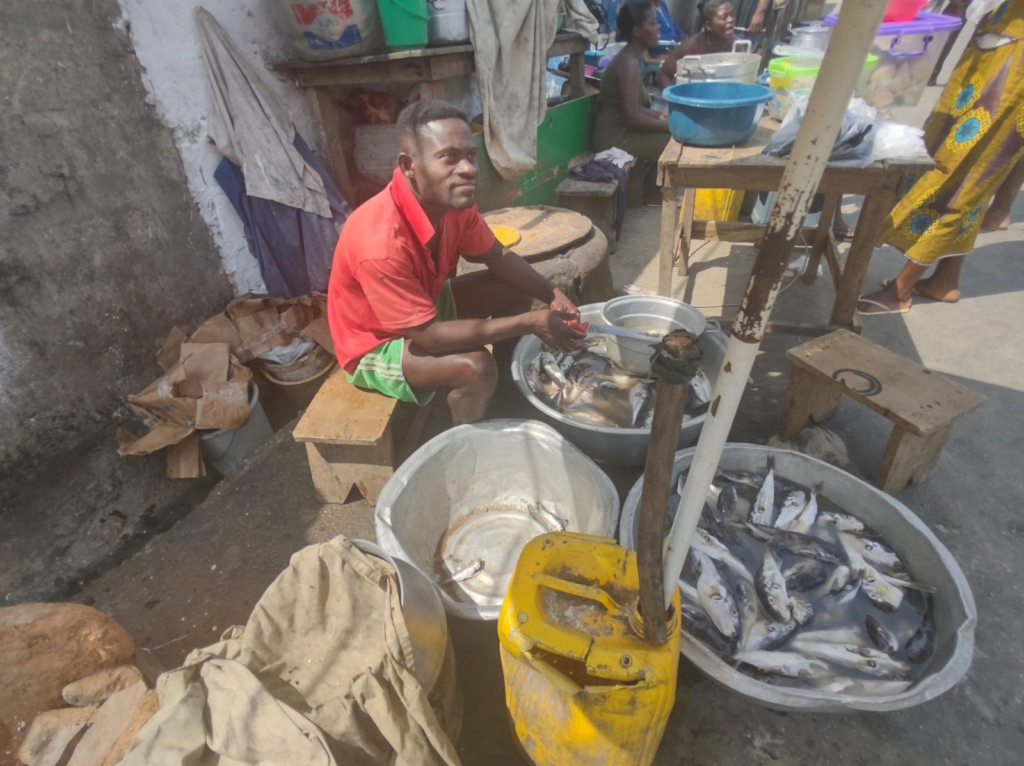
The total fish supply for 2020 was 595,869.23 mt, which showed a shortfall of 12.1 per cent against a target of 677,785.38 mt.
Commenting on the situation, Prof Akpalu says Ghana’s own local laws, the Fisheries Act 625 2002 and all the laws in the books do not permit foreigners to operate industrial trawlers in Ghana.
“The implication is that they fish in such a way that they destroy a whole ecological system, it destroys the ability of the system to produce more fish because when they fish using certain destructive techniques it destroys the benthic flow of the ocean and that leads to the environmental carrying capacity or the ability of the ocean to produce more fish for us.” Prof Akpalu says.
For an industry that plays a major role in sustainable livelihoods in several households and communities in Ghana, the fisheries sector must earn equal attention as others with regard to Beneficial Ownership.
It is hoped that Ghanaian authorities will step up their game.
Editorial team
This article is the result of investigations undertaken by the following journalists: Kizito Cudjoe (B&FT), Isaac Aidoo (The Finder), Emmanuel Wiafe Aboagye (Asaase Radio), Alberta Bissue Ansong (Metro TV), Adnan Adams (newsguideonline.com) and Prince Appiah (Multimedia).
About the report
This study was supported by the Opening Extractives Programme jointly implemented by the Extractive Industries Transparency Initiative (EITI) and Open Ownership (OO) and supported by the BHP Foundation. Its contents are the sole responsibility of the author and can in no way be taken to reflect the views and positions of the EITI, OO nor BHP Foundation. Any errors or omissions are the responsibility of the authors
Latest Stories
-
Greater Accra: Ambulance shortage forces dispatchers to prioritise only critical cases
3 minutes -
The ecological situation is dire and we need robust action – Awula Serwah
3 minutes -
Trump and Musk trade insults as row erupts in public view
13 minutes -
Scholarship with Professionalism: Nurturing career-ready graduates at UPSA
16 minutes -
CCCFS applauds new environmental directives, cautions against poor implementation
37 minutes -
Keta MCE, Forestry Commission launch ‘Tree for Life’ initiative at Tsiame
1 hour -
Otto Addo targets win against Chad on World Cup Qualification return
1 hour -
We are not at the World Cup yet – Otto Addo
2 hours -
Bouncy castle operator cleared in tragedy that killed six
4 hours -
Scholarship with professionalism: Nurturing career-ready graduates at UPSA
4 hours -
Australian mushroom lunch cook tells trial meal was ‘special’
4 hours -
Gov’t endorses Morocco’s autonomy plan for Western Sahara
4 hours -
Karpowership Ghana partners with Navy and Forestry Commission to plant trees
4 hours -
Time with the Amazons – UBA Ghana’s Women unite for inspiration and wellness
5 hours -
Ending plastic pollution: Why Green Entrepreneurship Matters
5 hours

